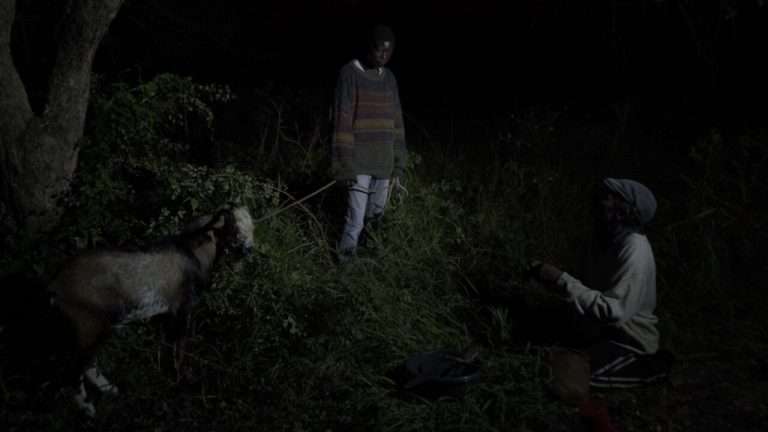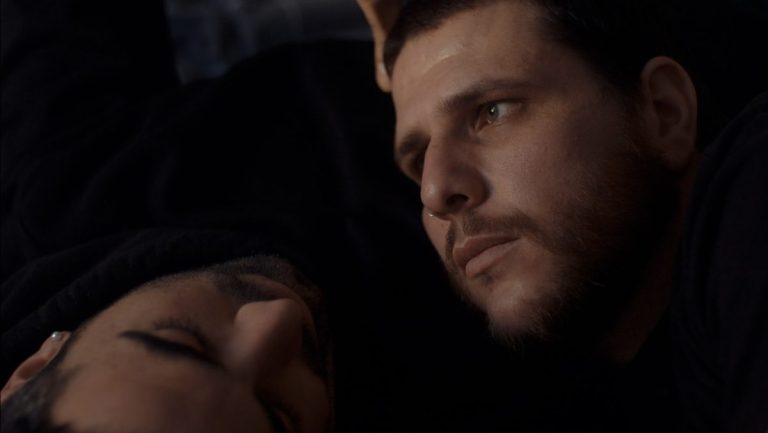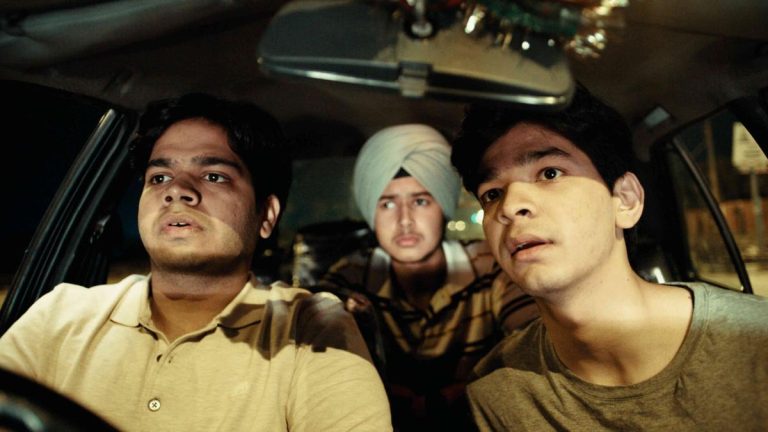One of the key things Fidel Devkota’s film, The Red Suitcase, demands upfront is patience. For a feature, the film seems terse and determinedly withheld. The storytelling is contained and expansive in the same breath, the linkages obvious but never pushed beyond a subtle and liminal space. The relatively short duration can be viewed as merciful considering the film’s keenly measured pacing, but what Devkota, along with his editor, Saman Alvitigala, accomplish here is far more complex and beautifully sinuous than its usual associations. The visual language is fluid and not bound to any spatio-temporal rigidities; dreams and grief mesh lightly, with more than a touch of the phantasm. All these are anchored in a deeply political elegy to a country and its government that has failed its people.
When the film opens with a phone call between a Nepali couple, unfolding over a dark screen, there’s an immediate strain of longing and sadness. The husband has been away for months, working abroad, and wouldn’t be able to make it to the naming ceremony of his daughter. It is striking that everyone in the film is rendered a nameless identity, except this child, almost as if suggesting there might be greater hope to be had in the future generation than the rot of the past and those of the present stuck in making amends, cleaning up the debris of what preceded them.
This couple retreats into the background, but the husband’s mention of being away as a migrant worker at the Qatar-held World Cup, combined with a later radio broadcast about scores of Nepalis forced to emigrate to the Middle East for work opportunities, continually register. They frame the particular socio-political context of the country, on which characters ultimately explode and share their anguish.
The connection between the couple and the film’s protagonist, an unnamed truck driver (Saugat Malla), delivering shipments picked up from the Kathmandu airport, gradually becomes clearer to a poignant effect. The narrative follows him as he makes his way through the mountainous roads set for a remote village in the Beyul valley. On the radio, he listens to an account of the sighting of a mysterious man skulking around with an empty red suitcase and a lifeless face. A passer-by (Bipin Karki) invites him to stay at his place for the night, advising it wouldn’t be wise to drive on these roads so late. This man is an army veteran, barely somehow scraping by.
As he himself puts it, he is without a present and a future. The film slows down further to circle a long conversation between the driver and the ex-soldier. Devkota makes the scene drawn out as the driver is initially reluctant but opens up in the other’s confidence. The considered elongation of time sparks a somber bond between the two. With the two positioned on the opposite ends of the table on which they have cold, leftover momos and drinks, the army veteran doesn’t keep himself repressed, wistfully remarking how he feels he should have died in the war in Kashmir.
The conversation slides into a burst of excoriating rage as the driver rails at the government, abdicating all responsibility for the country’s migrant workers. Stories of past and present devastation are exchanged, etching a bristling portrait of a country with a fast-eroding morality and a vanishing conscience. If things continue as they are, “Nepal will be empty,” he laments. Although the scene is overwritten to a fault, lifting the lid off the tightly orchestrated sense of aural mystery wrapping the film, the directness of the grievance holds a scathing desperation that cuts to the bone.
The real beauty of The Red Suitcase lies, however, with sequences that are seemingly peripherally edged off the central track of the driver on a fraught journey. DP Sushan Prajapati trains us to take in the desolate, overwhelming splendor of the landscapes and the steep, winding roads. A forlorn forsakenness almost always shrouds the atmosphere of this film. A bearer of misery, an existential weight curls itself around the driver; he is too emotionally invested in the implications of his job, and what it heralds about the larger sense of things, so when he can no longer rein himself in, his appeal is impassioned and wrenching.
When Devkota switches gears and takes detours into trailing the solitary figure with the eponymous suitcase traversing the roads, there is a pointed impression of a mythic aspect, the figure being more of an emblem than just an individual presence. An exquisitely tender, gorgeously shot dream sequence between the man, Dhane (Prabin Khatiwada), a migrant worker, and his wife, who’s recently turned a mother (Shristi Shrestha), after he returns home, carries a profound melancholy and surrender. A severe toll has taken on him, and he refuses to eat; all he wants is to rest in the touch of her gentle, nurturing care.
Read More: Fallen Leaves (2023) ‘MAMI’ Movie Review: A Rebellious Tragicomedy of hope set against an Unforgiving, post-capitalist World
The Red Suitcase thrives on Devkota’s flair for conjuring a moody, plaintive wonder. The distinctly stretched-out sense of time the film asks for may be alienating for some, but if you stay the course, it offers a sense of release in a characteristically muted, simmering manner. Though the denouement could have done without the tired, overfamiliar twist and a bend into melodrama, Uttsav Budhathoki’s instant-classic rendition of ‘Mareko Manish’ (A Dead Person), a lyric from Buddhisagar Ka Kabita, weaves an immediate enchantment, hitting a perfectly hypnotic final note. Devkota unfurls his film with a deep-set languor, slowly spinning a mystifying, quietly riveting tale that plumbs great hopelessness.
★★★1/2
The Red Suitcase is having its Asia Premiere at the JIO MAMI Mumbai Film Festival 2023.
Cast: B. Bishowkarma, Anju Deuja, Bipin Karki, Prabin Khatiwada, and Sonam Lama
Director & Writer: Fidel Devkota
Director of Photography: Sushan Prajapati
Editor: Saman Alvitigala







![David Attenborough: A Life on Our Planet [2020] Netflix Review – A Clarion Call to Save the World](https://79468c92.delivery.rocketcdn.me/wp-content/uploads/2020/10/David-Attenborough-A-Life-on-Our-Planet-Netflix-1-highonfilms-768x384.jpg)